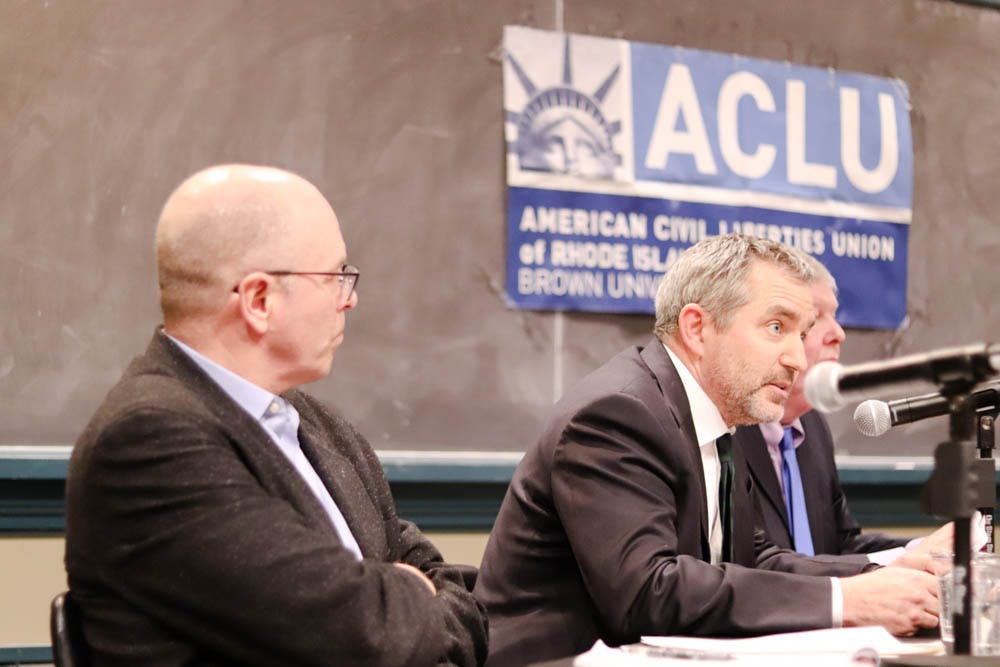“If I were writing a lede here, it would be that the Trump administration has shown a blatant disrespect and disregard for civil liberties, which has reverberated around the globe,” said Karen Bordeleau, president of the New England First Amendment Coalition and former executive editor of The Providence Journal, in a panel discussion Thursday night.
The American Civil Liberties Union of Rhode Island hosted journalists and experts in the field at the University in a panel discussion entitled “What Press? Whose Truth?” which featured a candid discussion on the nature of journalism under the Trump administration. Panelists included Bordeleau, New York Times correspondent CJ Chivers, political reporter for Rhode Island Public Radio Scott MacKay and Yale Law School lecturer Francesca Procaccini. The conversation was moderated by Lombardo Family Professor of the Humanities David Estlund.
Bordeleau emphasized that today’s suppression of free speech in political journalism is not unique to the Trump administration. “It should be said that it is nothing new that elected leaders — presidents, governors, mayors, Speakers of the House — have at times had a contentious relationship with the press,” she said, pointing to former President Nixon’s refusal to allow the Washington Post to cover White House social events, as well as former President Obama’s decision not to allow conservative reporters on Air Force One.
Even with the precedent of press censorship, the Trump administration has taken attack on the media to a new level, Bordeleau said. “Never before has a sitting U.S. president labelled journalists (the) enemy of the people.”
Trump’s highly influential platform as president offers him the dangerous power to normalize vilification of the media not only domestically, but internationally, Bordeleau said, adding that it gives “license to every other leader to do the same.”
Procaccini said that the Information Society Project Media Freedom and Information Access Clinic at Yale Law School — where she is the Ruttenberg Fellow — seeks to “use the law to protect journalists in the work that they’re doing.”
She offered “ways in which legislatures and the courts can better enhance protection for a free press,” such as establishing a federal reporter’s privilege, which would allow journalists to protect the identity of their sources without the fear of federal prosecution. This would ultimately foster greater trust between sources and journalists, she added.
United States courts should expand the “little-known” First Amendment right of access, which, she said, gives citizens “the right to know the substance of government proceedings and government information.” While it is currently a constitutional right to obtain transcripts of certain trial hearings, this right should be expanded to include government proceedings like deportation hearings, she said.
Chivers discussed the “criminalization of public information,” claiming that government documents have been over-classified and should be more easily accessible to both reporters and the public. Using WikiLeaks as an example, Chivers said that a large portion of the leaked documents “should not have been classified in the first place.”
When discussing how to uplift and “raise truth,” Chivers said, “we defend truth by calmly and unceasingly reminding the governments that they are they are there to serve us, not the other way around. And the practice of civil discourse, which is the foundation of civil society, demands transparency,” he said. “This means asking questions, filing lawsuits, using shame as a tool against the abusers of our rights. In short, it believes in the agency of the citizenry.”
The sharp decline in the number of active journalists in the United States undermines the concept of a free press, MacKay said. Furthermore, the advanced tools of the internet now blur the visual distinctions between credible, reputable news sources and sites that disseminate false information, a dangerous phenomenon that threatens reliable journalism, he added.
He also placed the onus on the public to be “better consumers of news,” adding that the current education system fails to properly teach students a basic understanding of the government — teaching to tests on math and science instead of civics and history.
Emma Schneider ’22 said that she attended the discussion because she has been interested in the work of the ACLU for a while and is particularly interested in the topic of freedom of the press. “I thought the remarks were really well prepared and really relevant, and they were very responsive to questions and enthusiastic to be here,” Schneider said.
Secretary of the ACLU at the University of Rhode Island Kaylee Goyette came to the event because she was “interested in the idea of free press” and wanted to see how the panelists interpreted the First Amendment. University of Rhode Island student Mark Gall said it was productive to “hear the perspective of actual journalists … who are involved in that area of the press.”





